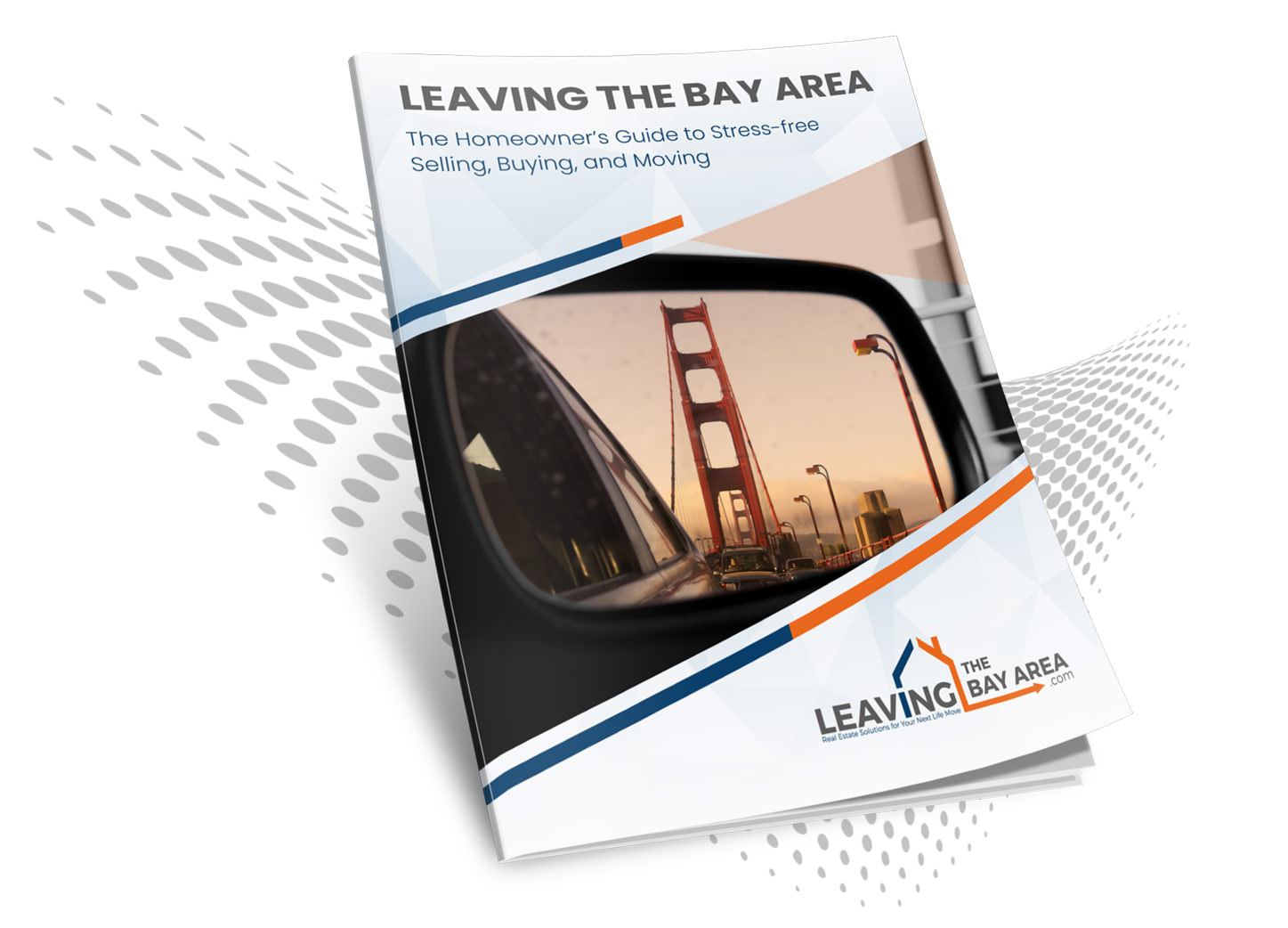Overall, Seattle, WA is 42% cheaper than San Francisco, CA
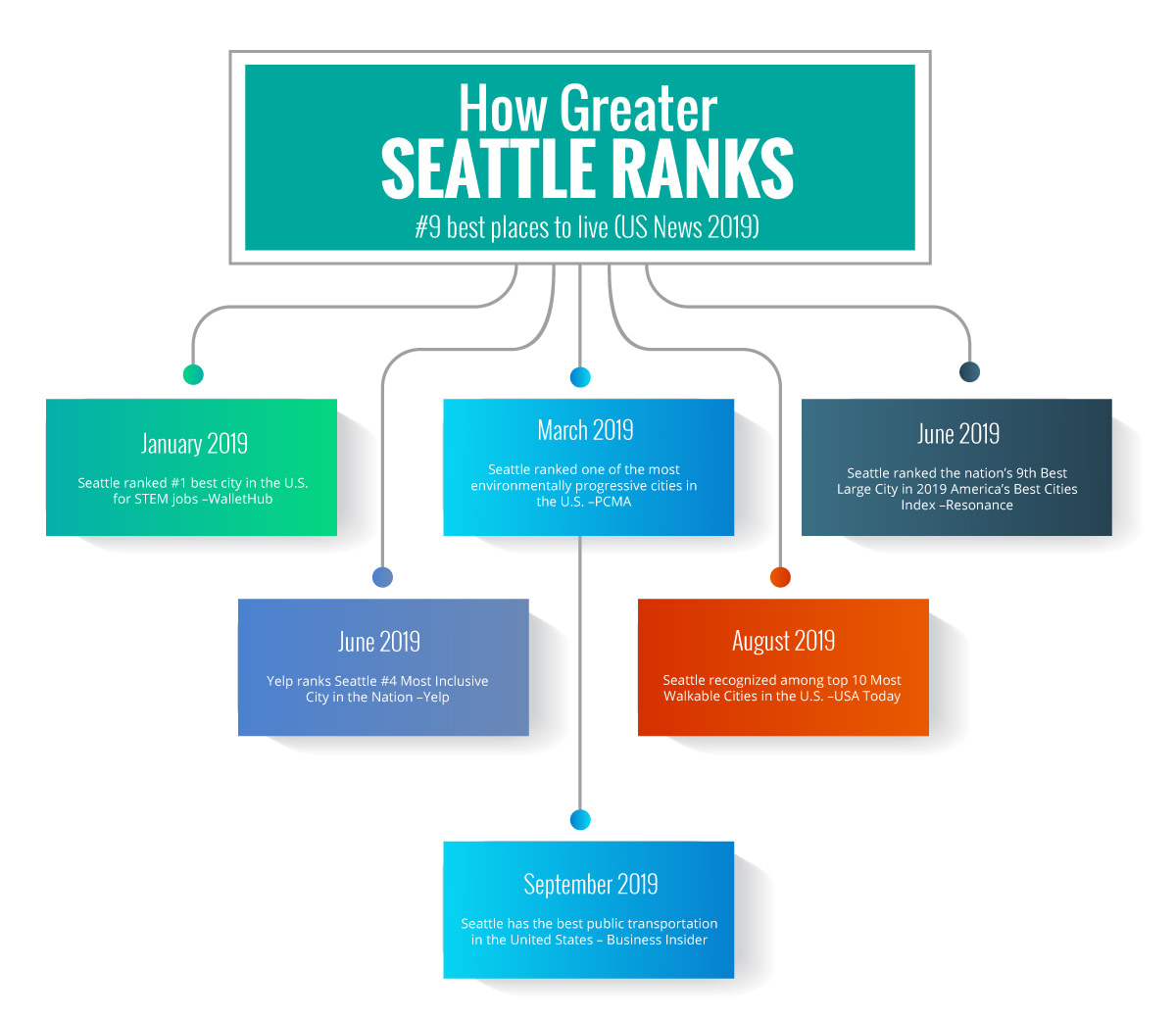
Quick Links
 Your Money Goes Farther in Seattle
Your Money Goes Farther in Seattle
 Seattle Webinar
Seattle Webinar
 Cost of Living Comparisons
Cost of Living Comparisons
 Commute Comparison
Commute Comparison
 Live Traffic Comparison
Live Traffic Comparison
 Climate
Climate
 Seattle Area Tour
Seattle Area Tour
Your Money Goes Farther in Seattle
Seattle, WA
VS
San Francisco, CA
$851,400 Seattle, WA
42% less
Median Home Cost
$1,471,200 San Francisco, CA
$7,918Seattle, WA
15% less
Property Taxes(annual based on avg price home)

$9,415 San Francisco, CA
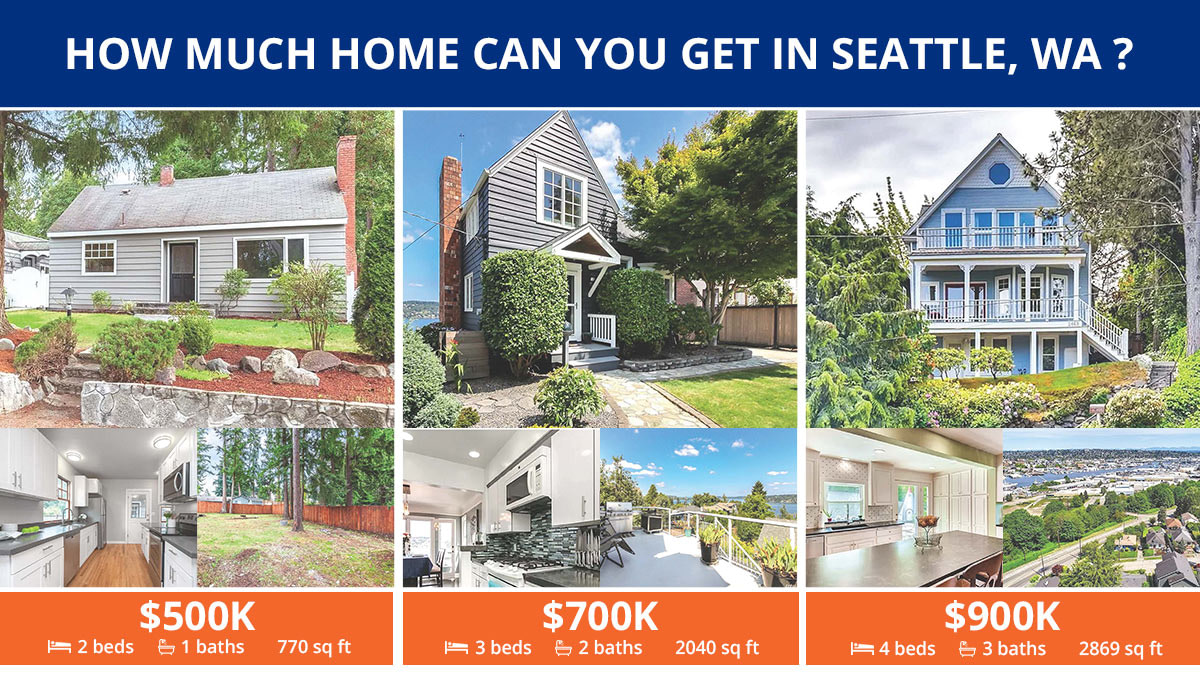
Seattle, WA Webinar
Everything you need to know about Seattle, WA real estate
FULL TEXT TRANSCRIPTION:
- I want to welcome everybody to LeavingTheBayArea.com: Market Insider Series where every week, we travel the country to visit some of the more popular places and we are seeing people relocate to. And today, I'm super excited because we are going north, up to the Pacific northwest to Seattle, Washington. And I've got a great couple of speakers with me today. I got Angela Crea and Lindsey Gudger with Every Door Real Estate. Welcome, you guys.
- Thanks for having us.
- Happy to be here.
- Absolutely, I appreciate you being on here. So, we're gonna talk about a lot of really good information. I'm excited to go through all this and obviously, there's a lot of people moving from the Bay Area up to the Seattle area, maybe for tech jobs, maybe for a lot of different reasons, but we're gonna talk everything about Seattle including real estate prices, cost of living, industry, technology a little bit, you know, we're gonna get into a lot of different things, but before I get into that, for those of you who are on the live broadcast right now, we are going to, first of all, we launched a couple of polls. If you wouldn't mind filling those out real quick, takes a quick second, and that helps us to know, you know, what information you're more interested in learning about, and we've also got a chat feature. And you can raise your hand, press that button, and let us know, you know, what kind of questions that you have throughout the process here so again, Angela and Lindsey, thanks so much for joining me today. And tell us, you know, give us kind of 60-second overview. What you guys are doing up there and how long you have been doing it?
- Sure, so Every Door Real Estate's been a brokerage for about three years. We were a team for three years before that. Our 36 agents are the number one selling team or group in western Washington at this point so we do a lot of business. I'm sure that sounds like bragging to give you a sense of like scale and understanding of this market and all the submarkets that we face in Seattle.
- And you've been, I mean Lindsey, you've been involved in real estate, the corporate side of it, you know, the broker side for quite a while right? So you guys are pretty experienced in all this.
- So previously to real estate, I was in Zillow for six years along with my the co-founder of this company, Jason Gasbarra, who was there for seven and we're involved in everything from their advertising sales to new product creation on kind of the revenue side of that business, great opportunity in real estate to provide a better, I don't know, higher quality of service. Smoother closing process for clients and I think we, I don't know, we're getting our way to delivering onward north.
- Yeah, well you figured if you're going to follow the footsteps, it's better to follow the footsteps of a leader such as Zillow, right? Because they're really kind of the leading edge of technology for real estate, being able to best service the client, but they're not on the brokerage side which is why I'm not calling up Zillow to do this and it's great to have you guys because you can kind of give us really the ins and outs on the local real estate market. So let's dive into that a little bit. I think for people who are interested in maybe going out to the Seattle area, again, they might be going up there if they're retiring, if they're following their kids or grandkids up there, maybe they're going up to, you know, for a job transfer with their company, or perhaps, they're just thinking, you know, maybe there's a better cost of living up there, and possibly, even an equal type of pay for the position that I'm in currently in the San Francisco Bay Area. So the next question becomes, how much does it cost, right? What does it cost to live there? So why don't you guys kind of go through that with us? Give us some examples, you know, some price ranges of some of what you would pay and what you would get in that area.
- Sure, so I guess Angela's gonna do a, load something up so that she can share a screen here, but before we dive into that, the thing that you should know about this area is that there's huge variants so within an hour of Seattle, you could spend a whole lot on my Bay Area standards or very, very little on housing. And we're gonna walk you through kind of the four major areas as Angela's broken 'em up here. But this just, far from an exhaustive list, right? If--
- Of course. You could look for hours and not exhaust everything.
- Yes.
- Yeah, we're just. Yeah, I'm gonna talk. We'll show a couple pictures here, but basically we're gonna show you kind of the, an average house in each one of these areas. We're going to about an hour north, an hour south, and about 30 minutes east.
- And we're gonna pull up the power of technology, 'cause yeah, this is fantastic.
- [Angela] All right, so we're starting off just right in the heart of Seattle. We have about a $900,000 house, four bed, one and three quarter bath, about 1700 square feet.
- [Lindsey] Yeah. Built 1930. So you could find this house still last year for a very similar price, very similar square footage, it just wouldn't have quite the amount of land that sits around this particular lot.
- [Angela] So and then an average price condo running about five 50, and that's a one bed, one bath, about 800 square feet, and this one's built in 2007. This is kind of the average price that we're gonna see throughout the city of Seattle. We also then included just a lower end, kind of the intro level condo, we see a lot of people getting their foot in the door closer to this 300,000 price point. And that gets you basically a one bed, one bath, about four 30 square feet. And this one's built in 2003.
- [Scott] Now is this considered downtown area, these two examples that we've looked at?
- [Lindsey] Great question, so if you go back a slide, that would be considered, that would be a condo you find more in the downtown core, urban, what I would define as a walkable distance to all the major employers that have located downtown.
- [Scott] Got it.
- [Lindsey] This is going to be still Seattle address, the one onscreen now, it's still gonna be a Seattle address, but it's going to be in one of the kind of outer neighborhoods. So if you think about, I don't know, New York has boroughs, Seattle's a very neighborhood-centric type of city, where from neighborhood to neighborhood you see huge variants in who lives there, the type of housing, the type of amenities. This would be probably like a, if I had to guess, where this picture is would be north end.
- [Angela] Yeah, so this is probably about 10 minutes outside of that inner downtown.
- [Scott] Okay. So still pretty convenient relative to services and businesses and everything like that.
- [Angela] Absolutely.
- [Scott] Okay, good price at that, yeah, okay.
- [Lindsey] Very commutable distance, either by public transport or by your own car into downtown if that's where you work.
- [Scott] Got it, okay.
- [Angela] All right, so moving on. This is gonna be the west Seattle area. It actually has a really almost a small town sort of community feel to it. And average priced house over there is gonna be about 750,000 and once again, that gets you about a three bed, one and a half bath, about 1700 square feet. And this one's built in 1919.
- [Scott] So, a lot of older homes, but they look like they're, I mean they're really well taken care of.
- [Lindsey] Some of 'em. As you know, built early 1900s houses have been very pretty gritty. We've got some beautiful examples that have been restored or were kept nice and improved along the way. And then obviously you're gonna run into tear downs. This is--
- [Scott] Yeah.
- [Lindsey] Upper end of that range.
- [Scott] Okay.
- [Lindsey] west Seattle's pretty unique, you're absolutely right it feels separate. Like the way that you get to west Seattle has a lot to do with that and geography as a whole in Seattle plays a big part in why the cost of real estate changes so much by distance. We have two huge bodies of water, Puget Sound on one side, Lake Washington on the other, that keeps the area that you can build small. This isn't like Texas where you can just keep building in--
- [Scott] Yup.
- [Lindsey] Bigger and bigger concentric circles. We have mountains and sound and a huge lake right in the middle of everything that puts some constraints on where you can build new homes.
- [Scott] And for those in the Bay Area it's probably very similar just because we kind of have the same thing, you can't really build east, and there's a lot of restrictions, I mean, just in our state overall, but especially the Bay Area and you build, they're building up, right? You just continue to build up in a lot of the more metro areas.
- [Lindsey] Absolutely.
- [Angela] So and the two exceptions to that, the two directions that we can go a little bit further out are gonna be north and south. So that kind of leads us to our next slide here, and I'll tell you, the Everett area is sort of the first big city little town just on the north side of Seattle. It's where we start seeing what people would consider as a little bit more affordable. I think it's where we start seeing most prices drop a little bit. This is gonna be a $400,000 dollar house. Three bed, one bath, 17 50 for square footage, and this one's built in 1945.
- [Lindsey] So driving this area--
- [Scott] How far out would this be from downtown area from Seattle?
- [Lindsey] A good hour. A little bit more in heavy traffic.
- [Angela] Yeah. A little bit less without. So right around an hour commute north of Seattle.
- [Lindsey] Which cut the cost by more than half. By giving up that commute.
- [Angela] So now we're actually gonna go over east of Seattle. We have the Bellevue area. I would say this area, it's a little bit longer established, they're very well-known for their schools, it's a little bit more of a family-based mentality I think over on the east side. And so here we're looking at about a million for a four bed, three bath, 2,800 square feet, and this one is built in 1975.
- [Scott] Okay.
- [Lindsey] Costs will generally be a little bit higher on the east side than they are, they've outpaced our average price point in Seattle itself. Year over year.
- [Scott] Okay, excellent.
- [Angela] And then Tacoma. So this is going about an hour give or take south of Seattle. Sort of the same idea as Everett, people that wanna get a little bit more house for their money. Once again we're just under half the price of the homes right in the city. And that's at 350,000 for four bed, two and a half bath, 1600 square feet, and this one's built in 2006.
- [Scott] And I hear Tacoma quite a bit. Is that becoming more of a popular area just because like you mentioned it's not too far proximity but obviously you're getting a lot more for your money.
- [Lindsey] A week ago, I don't know if it was Seattle Times or a national publication named Tacoma the hottest housing market in the country. Yesterday we had an offer in on a house there, we got 17 offers. That's what we were seeing in Seattle if you go back about a year and the three years previous to that time, that was common in Seattle. It's moved south to a more affordable price point, and now we're seeing multiple offers, and what we call review dates here on almost every home that sells in Tacoma.
- [Angela] The other reason a lot of people have heard of Tacoma, is that our Seattle airport is actually the Seattle Tacoma airport, and it's right actually in the middle between downtown Seattle and Tacoma. So that's kind of the other claim to fame.
- That's great. That's a really really good overview of some of the different price points that you would look at in some of the different areas. And let's talk a little bit more about some of those home price trends. So obviously the market's changing and I think you guys had a little bit of a change in the market earlier or I should say late last year like we did here in the San Francisco area. And what are you guys seeing right now, as far as average days on market, how many offers you're getting in some of those areas, and things like that?
- So, it's heating up again. Not that it ever got cold, I mean, in comparison to most of the country, we've been in an established seller's market for the last four if not five years.
- Yeah.
- Oh gosh, maybe even six now. There was a point at which about May last year, where the seller advantage lessened a little bit, so we became a little bit less, but still very much a seller's market, and that went in through about December of 2018. January 2019 everything switched again, and we've been progressively selling off the inventory that had been built up, and now we're back in a position where sellers are not to the same level of leverage that they had say a year and a half ago, but moving in that direction. Get outside of Seattle, anything affordable here is seeing multiple offers, and by affordable, we're talking about correctly priced, of course, you're not gonna get a million dollars for a half a million dollar home, but anything under 450,000 is selling very very very quickly, regardless of where it is within an hour of Seattle.
- And so we're gonna say that it is a seller's market, like you said, same thing as the Bay Area, it's not like it was two, three, four years ago. Sellers may have an advantage, but there are still some good opportunities for buyers who are coming in and a lot of it like you said, is gonna be very area dependent, right?
- Very much so.
- Very specific areas specific is what that looks like. What's your average days on market right now?
- I'm gonna say average across the entire region is gonna be 20 to 30 days. There are areas where it's 11 days. The problem with all those numbers is the areas that it's 11 days, it's purposely 11 days because the seller says, I'm not gonna look at offers until a week from now. So you get seven days automatically like--
- To be quicker.
- Right. And I guess that if you took that off and we didn't have that practice in the hottest areas of Seattle, you could be under five days as an average days on market very easily.
- Okay, got it. So let's say for example if I'm in the tech industry, and obviously we're gonna talk about that a little bit more, Seattle's tech industry is very very hot. And it's mirroring and competing with San Francisco and Silicon Valley on a lot of different levels. But if I'm looking to potentially relocate up there, of the different areas that you guys talked about, you talked about Seattle, as far as single families, condos, west Seattle, north, east, and south, where would I most likely be interested and focusing on maybe one or two areas, if I'm coming out to let's say if I was single or I'm married but coming up no kids yet, where am I gonna focus on?
- I mean. The best opportunity that exists right now is downtown condos. And a couple of things go into that, but if I were looking for a good deal, like that was my driving force and I was looking for something that on a five to 10 year horizon is gonna appreciate quite well, I don't think there's a better opportunity than a downtown condo right now.
- Got it.
- For a bunch of reasons. We have a ton of apartment buildings that just finished. So you have some competition, right? I can rent or I can buy. So, sellers in downtown condos are having a harder time selling, which means that you've got a better opportunity as a buyer to get a great deal on something. So that would be one of the first place I'd look.
- So a lot of competition is always good, especially for buyers, and like you said, when you're comparing I can rent for this, I can have a mortgage payment and everything else for this, it helps to kind of keep those prices maintained a little bit. Are those mostly new construction as far as the condos, or is it a mix of resale and new construction?
- Yeah, so it's mostly resale. We have some laws that were put into place 15 years ago that made new condo development in Seattle very risky for developers. It basically pinned them to future issues that could arise with the building and we have a bunch of problems 'cause we have wetter weather, with this faux stucco product and having to redo all these buildings and redo the exteriors. So, developers got a little gun shy on building. However, there's two or three luxury condo buildings that are coming out of the ground right now that are pre-selling that are pretty great opportunities.
- Okay.
- The other big piece of that too is that you said if you're coming in and you're working in the tech industry, your job is probably gonna be right in that downtown area. That's where a lot of the things are going on, it's where the action is, and then the other piece of that is most people that end up buying in that area have very similar mortgage payments to what they would be paying for rent in that area. So that's kind of fun factor right? It's for a similar price per month, you're basically owning in the same place you'd wanna live if you weren't buying.
- Absolutely. And you get all the tax advantages and everything else that comes along with the ownership piece of it.
- Absolutely.
- So let's kind of talk a little bit more about maybe retirees who are looking to come up to that area. Now I understand that there's, we have a lot of markets that we see people from the Bay Area relocate to. Seattle may not be in the top five, you know, for retirement reasons per se. However we do see a lot of people who are going up to the area because maybe they're following where their kids and their grandkids go to. So they live in the Bay Area, they've established a good amount of equity in their home they're thinking okay, we're ready to make a change, or maybe we wanna be near the grandkids a little bit more often, so we're considering moving up there. Tell us a little bit more about maybe some of the active adult or the retirement communities that would be good options for people who are considering moving up there for that reason.
- Absolutely. Well I would just say also that Seattle as a whole is gonna be a really active community. We have a lot of things like farmer's markets and events in the park and so a lot of the things that I think most people are looking for when they're looking into buying into a community like that, they can find other places here. Now, that being said, we do have a couple of communities that sort of specialize in that community feel. One of them is gonna be Huntington Park. It's actually located just south of Seattle. This one has a little bit better price tag on it, they're claim to fame is that it's an affordable active adult community. And this has, I think it's 32 duplexes, 17 condos, and 187 single family homes. So it's a pretty good size community. And we're seeing prices on those ranging from the about 300 K to about 450 or 500.
- So it sounds like they're advertising it the right way, because that's pretty affordable, right? It's not like oh, this is affordable and you're up to, you know, six, 700,000.
- Yeah, it's actually a pretty affordable option for, especially the area that it's in, it's about 15 minutes south of Seattle.
- Okay.
- And then another option as well is gonna be the Trilogy 55+ community, Redmond Ridge. So that's gonna be over on that east side that we were talking about, that Bellevue Redmond area. And this is a little bit more focused on sort of the high rent, luxury side of things. This one it has 1600 single family homes that range in the $500,000 range up to about 1.3 million. So this is a little more luxury. They have a golf club, community center, pool and spa, fitness facility, so this is gonna be a little higher end amenities.
- And we have some of the Trilogies in our area, and they're beautiful. I mean, it's like you know, when I get to that age, and I'm not quite there yet, but it's like, with all the activities that they offer and everything as far as, even welcoming new people who are maybe new to the area, don't have a lot of contacts, friends or family, it's just a very very good experience for a lot of people.
- Sure.
- Excellent. Okay, so we covered kind of the active adult type of communities. Let's get into a little bit I think what a lot of people are interested in is industry and employment. Now I was reading something and this came from BuzzFeed and this was late last year. No city has added more tech jobs in the last two years than Seattle. So they're referencing 2016 to 2017. Seattle outpaced all other markets in terms of jobs added, with Silicon Valley ranked second. Pretty big claim to fame, right? So tell us kind of what you guys are seeing, who are some of the major players in the industry, the growing organizations and businesses up there, what are you guys seeing up there?
- The reason we won that was one word, Amazon. Was the bulk of us winning that. And they're the big gorilla of our market, right? And even with them, announcing two different additional headquarters and then axing one of those, in this region and not just Seattle, now Bellevue has become a very popular area and the place that they're spending a ton of money developing and leasing right now, to move some operation over there on the other side of the lake, they're gonna be the big one. But it doesn't really stop there, little company by the name of Microsoft is--
- Can't forget that one right, yeah.
- And not forgotten by any means, but employs a tremendous number of people in this area and has for a very long time before them it was Boeing. In the non tech field. But the Bay, more of the jobs that are created here are going to be in the tech space or supporting the tech space than anything else, right? We've got Facebook with a pretty decent footprint here, Google now with a pretty big footprint here, Expedia's headquarters I believe are here. And then you go to the second tier, Zillow, where I worked for years is based and headquartered here. And then you've got the startups that are born out of all of that tech talent. It's a really really educated city.
- Sure.
- I don't know if it's nationally number one, if it's not it's very close in terms of per capita college degrees. Now, we all know that's not the end all be all of intelligence, but that tends to result in a lot of people that are kind of forward thinking, progressive and the startups that have come from that line of thinking, you see them all over the place, right? There's a lot of small companies being born here.
- And I think you just say, like, a lot of those educated people who are in Seattle or coming in to Seattle, that's really only just gonna continue to push companies who are in San Francisco, Silicon Valley and other areas up in there because that's where their talent pool is, right? So they're saying this is where our talent's located and these are some of the best in the business, we already have established tech there, it makes sense for us to consider even just maybe satellite operation up there. 'Cause we can take advantage of the talent pool that you've got there.
- Absolutely. Once Amazon is established, it makes sense to go open up next door and try to snag a few developers here and there from that workforce.
- Follow the leader, right? If Amazon's up there, there must be a reason and yeah, maybe we can ride the coat tails and grab some of their talent from them. Yeah. So we talked a little bit about what's going on with tech, but tell us a little bit more, that kind of leads into, you said education. People are very highly educated, what are some of the larger universities or just educational facilities up there that are very popular, that are turning these people out?
- Yeah, so. We have the University of Washington, and I think that's probably our kind of biggest claim to fame in the area. That's just gonna be just north on the north side of Seattle, just a few minutes outside of downtown. Also there's a couple other ones right in Seattle. We have both Seattle University and also Seattle Pacific University as well.
- To give you kind of a sense of scale, University of Washington is somewhere in between 30 and 45, 35 and 45,000 undergraduates, so big major university with a research focused, to a degree. That's driving a lot of that, a lot of the folks that are working at these major tech companies were not educated here though. It's a lot of relocation, especially from where you're sitting right now. Folks that worked in tech in the Bay and wanted more affordable lifestyle four years ago right? Seattle was maybe first or second or third on your list of places to look at.
- I would imagine a lot of the companies that are in there are probably working with the universities and education systems to help fund programs, right? That are really geared towards continuing to better people and better prepare them for the market.
- Absolutely.
- Yeah, okay. So let's talk a little bit about Californians don't much like to talk about taxes. It tends to be a sore subject, because. Usually when you rank really high at something it's a good thing, but in our case, it's not always a good thing. Washington is known for no income tax. Am I right?
- It is.
- No income tax.
- It's wonderful. We do have you beat here, we do not have a state income tax.
- Okay. So give me kind of an idea and look, I know we're across the board on this, and we're gonna use some averages, and we have to say that we're not CPAs or.
- Absolutely.
- But a lot of people are interested in what's a relative property tax rate. Now, in our area most of the counties it's gonna start around one and a quarter percent of the assessed value of the home, and it could go up, but there's additional substance for parks and schools and different things like that. Can you give me kind of an average of what your property tax is, even though it might vary?
- Yeah, it is gonna vary, right, it's layered. So there's a state level, county level and then city level. But just a hair over 1% is gonna be what you pay in most areas. So if you were to Google what is Seattle's, it would be 1.06%. And that's on the tax assessed value of your house, so land plus development, equals your total tax assessed value. That is not and I'm not an expert in tax laws by any means, that is not what you bought the home for. So we aren't like resetting your tax payment every time a house sells that--
- It's not reassessed.
- Correct, correct.
- On the purchase, okay.
- Exactly. You have that sale on that home has an impact, because that area's algorithm that the county's using to assess that tax is impacted by every sale, but if you bought a place for 900, you are not going to pay 1.06% of 900, you're gonna pay probably something that lags behind a little bit.
- Got it.
- It's generally a good 10% to 15% behind what current rates are because we've been climbing so quickly.
- Got it. And so as far as sales tax rates, I like to include that. The reason I'm probing on these questions is because you guys don't have a state income tax, but you have to fund schools, roads, public services, everything like that, where is the money coming from? So as far as, well go ahead. You wanna answer.
- You have us beat there. So you're going to pay a hair over 10% in sales tax here.
- Got it.
- 10.1 I believe is the last number I saw. And that's gonna also vary, depending on where you're spending that money. And that's city-driven. So you have a state sales tax and then a county sales tax that's laid on top of that and then an individual city sales tax.
- So the cumulative maybe around just over 10%.
- Just over 10.
- Okay. And we're at, again it varies a little bit per county, but we're a little bit over eight and a quarter percent. And up, in some cases. So, although we have you beat, if we kind of look at the overall your bottom line taxable situation, with no state income tax that obviously is a big benefit to a lot of people. And as we tell a lot of people, if you're considering making a move, whether it's to Washington or to Oregon or anywhere else, certainly talk with your financial planner and your CPA to find out what kind of impact does that have on you, whether you're of working age or whether you're retirement or retiring soon, how the state's laws might impact you. It's obviously a really big planning piece.
- Very smart.
- Yeah. I wanna remind everybody if you have any questions, feel free to raise your hand and let us know. We'd love to have some questions. Talk a little bit about healthcare. So we talked. And that seems to be one of the biggest questions that I get, especially with people that are getting into their 50s, they're thinking if this is going to be the last move that I make is to this area, maybe not this specific house, but to this particular area, I have to make sure that I'm comfortable with the service providers for healthcare that are in the area. So tell us a little bit about maybe some of the hospitals and clinics and where they're located at in relation to the downtown Seattle area.
- Yeah. So we actually have quite a few really well-known hospitals that are right within the city limits of Seattle. With the University of Washington we have that U-dub medical center, which is a nationally known hospital.
- Okay.
- Seattle Children's Hospital, located right downtown. We have Swedish, Virginia Mason, and Kaiser Permanente. I'll tell you all those areas we talked about earlier kind of north south east and west, each have their own little cluster of hospitals in them. So you're never too far away, you're never an hour out from a hospital, you're always a few minutes from something, so.
- Sure.
- And if somebody comes in and says this is one of our priorities, is to be within 15 to 20 minutes, and of course they work with you guys the experts to say okay, let's get you into this area to make sure you're not gonna be too far away if you have any concerns in the future, right?
- Absolutely. Totally doable here, there's every one of these major hospitals has a number of satellite offices as well throughout the city. So we are well covered when it comes to healthcare.
- Awesome, good to know. So let's, obviously with the growth that's taking place in Seattle we're talking about, and I don't wanna call it sprawl, but just the growth that's happening in each of the directions. What are some of the transportation options, because obviously in a lot of areas, the concern becomes if you have this sprawl and you're overdeveloping, but you're not taking consideration the public or different types of transportation. What's popular there, and maybe what's in the plans for that growth?
- So one of the things that's kind of unique to Seattle is we have all these different areas and neighborhoods but they're only a few miles away from each other. So one of the really good options in our area is gonna be rideshare. Lyft, Uber, we see people coming from other places and they're just shocked that almost, no matter what part of the city they're in, they can get a car within a couple minutes.
- Yeah.
- So that's definitely a really big one here in Seattle. We have a pretty good public transit system. Right now we have a light rail that runs from basically that Seattle Tacoma airport up to downtown Seattle. And they're currently working on expanding that actually all the way up to Everett, down to Tacoma, and over to that east side of the Bellevue Redmond area.
- What's kind of the time frame for that? Have they said? 'Cause usually you double it, but.
- Every time they stop, it gets further and further out. So University of Washington I think you can go to the U district now which is 15 minutes north of the core of downtown and I think every five-ish years, three-ish years they open an additional stop further. East side is probably a good five or six years out. But layered on top of that light rail system is a pretty good bus system that utilizes HOV lanes so you're moving faster than you would if you were driving your car. I think we have rough traffic here, not terrible, but not great. But I think we've got some public transportation options that can speed up your commute.
- And I think that's always a challenge, right? For any large growing city, especially a city that's growing up and trying to grow out at the same time, it's challenging.
- Sure.
- So it's being able to figure out how to put all that together. I want to, we have a question here, any retirement communities with continuing care components? So I'm assuming that gets into more of assisted living, or more of dementia care, maybe more of those specific care options.
- Sure. So lots of options in that space at greatly varying price points. I've actually been through this search not too long ago for aunts and uncles. And it's something that we're relatively familiar with. You could be in the core of downtown, one of the best facilities in the city sits right above our convention center in the middle of downtown. Like do not need a car type of living situation with Uber if you need to go a little bit further than you want to walk. And as you go out from there is gets less and less expensive, right? It's location, location, location is kind of the key to that world as well. If you go up north of Seattle or even beyond and got out of the Seattle address, you could find very affordable living in that world where you're in a maybe in what feels like an apartment or a condo to start with, and there's progression right through hospice, with different levels of assistance along the way.
- And I think those are really cool, 'cause we're starting to see some of those types of communities and not necessarily in the Bay Area but in a lot of other areas. They're very forward thinking. They're saying, we're gonna put together kind of an active adult 55, but within that community we're also going to leverage that into options for assisted living, maybe it's dementia, memory care, and then to hospice. So it's almost like they can encapsulate all of those services into one community, so it makes it a very very easy transition, right, for the individual through that process.
- Absolutely.
- Yeah. Okay, so let's talk about what's fun to do up there. What are some of the popular recreation activities and things like that? If I come up there, what are you gonna take me to do?
- Yeah. Well the big one is that Pike Place Market. That's the thing everybody knows Seattle for. And I'll tell you, tourists and locals alike, it's a lot of handcrafted local vendors, selling really unique products, so that's definitely a big draw. We have the Seattle Art Museum, Pacific Science Center, another big one for this area, we talked about it being a really active area, we have a lot of hiking, that's within an hour to two hours just outside of Seattle. So you can be right in the hustle and bustle and within an hour or so you can be out in nature and really get some cool views and cool heights.
- I think active outdoors is big here. You've got skiing 45 minutes away during winter. You have every water sport you can imagine because you have salt water, so if you're more like fishing inclined, whatever, you have that, and then you have Lake Washington that's gonna be a little bit warmer that people are boating on all the time as well. And everything in between. If you are interested in getting outdoors and can deal with Seattle, I guess mist you'd call it, we don't really have rain here, just kind of.
- The mist, I like that.
- There's a lot to do. And if you're more of an inside person, we're a major metropolitan city. Everything you can think of that is in other major metros you're gonna find here. But you won't find, or what you will find here is outdoors stuff, hiking, biking, skiing. All that stuff is a stone's throw away.
- And it seems like people along the west coast are just generally pretty into health and fitness, right, and outdoor activities, and so, kind of what we're used to seeing here is probably a lot of what you guys see up there as well.
- Yes.
- Yeah. And I guess you're close to Victoria, which is just north, about how far is that?
- It's been a while since I've done that, so we have an actual passenger ferry that leaves from downtown Seattle and goes straight to Victoria called the Victorian Clipper. I don't know, is that an hour and a half ride?
- That sounds right.
- Yeah. Vancouver is three hour-ish drive.
- Yeah.
- A major north American international feeling city just on the other side of the border into Canada. So you're three hours south to Portland. And if you want desert you're two hours east and you're over the mountains into what feels like a different state, really. There's a lot of options if you're looking to get out of town and don't wanna go too far that you can just simply drive to from Seattle and have a completely different feel.
- And that's nice. I think that's one of the benefits we have as well. And it's very similar. You wanna be able to not have to jump on a plane, but just say, for a long day, or maybe an extended weekend, we're gonna go somewhere and just feel like we're completely out of the area for a couple of days. That's a nice feeling.
- Absolutely.
- Yeah. So let's talk about getting into more of the weather. People I guess outside of Seattle call it rainy. Lindsey I guess you call it a mist. But tell us about what's going on there. Is it really raining most of the time, or is that just kind of what people say?
- It rains a few minutes every day. We get a light little sprinkle. But you don't see a lot of the hard thunderstorms, the big rains that maybe the middle part of the country is well known for. So it doesn't happen very often here.
- Yeah. When people say rain, people in Seattle think, I think this way, small drops, I throw on a rain jacket, I'm gonna go do all the things I would do in any other day.
- Yeah.
- People from other parts of the country when they hear rain, they're like, yeah, I'm gonna get soaked if I go outside. That's not really what we have here. It's just kind of a mist.
- Well and that might be similar to what we get in San Francisco which sometimes creeps over into the east bay hills. But it is a mist, and a lot of times it burns off. So it's actually kind of nice sometimes, right? You enjoy that because it might start off a little bit cool in the morning, warms up in the afternoon. And then you guys see that in the summer time as well, or is that year round?
- Yeah. I mean, our summer probably starts in July-ish, July August September are gonna be the key amazing months to be home. That's when you don't wanna go on vacation because it's so beautiful here. Winter is can be dreary. If you're affected by not having enough days of sun, that's when you're gonna wanna plan your travel. We have a major hub, just like you guys. Get basically anywhere you want to in the country with a direct flight from Seattle. At SeaTac you have options. It's green here. You don't get that without at least a little bit of rain.
- Well you know, and it's beautiful. If you look along the northwest of the country and the west coast, it's beautiful. It's unlike anything anywhere else and obviously we experience that here, we appreciate it, and for people who are looking at different options, it's probably again, it's not gonna be unknown to them when they get up there, and they'll say, oh, this is kind of the same temperament, topography. Similar. Okay, so we are running up on perfect timing here. I've got 12:43. Is there anything that you guys wanna kind of throw out there that maybe I didn't talk about, or maybe wanna just touch on a little bit more that somebody should know or might wanna know if they're considering taking a trip up there or maybe relocating?
- We've been through the major stuff. What I would say is like, if you have specific questions, or you're thinking about taking a trip up here, just to check it out, call us. Get in touch with us. More than happy to give you everything from restaurant and hotel recommendations to show you around some of the stuff that you should see while you're here. Seattle is unique, I guess the greater Seattle area is unique in that it would be hard for me to think of someone that we couldn't find the right place for them here.
- Yeah.
- Because it is wildly diverse, jobs are varying and there's many of them and we're hungry for more talent. I don't know, it's a good place to be, whether you're family or single or retiree or whatever. It would be hard for me to imagine that we couldn't find you a good home.
- And I always suggest that, 'cause we talk to a lot of people and I have people that say Scott, we're ready to make a move, we don't know where that's going to, so it's really kind of a discovery phase, of okay, tell me what's important to you, lifestyle everything else, we cover that. And then we'll come up with, here's a couple of areas that I think you should check out and this area being the first one. It's really about, you get involved in this analysis paralysis, right? So you're online and you're trying to do all this research, and you're trying to do everything and it's not getting you any progress. It's maybe making you more confused. Take a trip up to visit for a couple days, long weekend, whatever it is, and maybe even spend an afternoon with you guys and your team, right, just to say, based off a consultation, here's some areas that maybe we can focus on a little bit, during our afternoon trip or whatever that looks like. To really be able to say, here's what it is. And you can only do that by getting there front and center.
- Yeah. Angela is joining us today for a reason. This is what she may not consider this. But I would consider this her specialty. There's probably not someone better at helping someone evaluate what their wants and needs are and then going and showing them five or six different options in the greater Seattle area and then giving them that kind of education of the market.
- I've worked with a lot of people that are relocating from out of town, so hopefully, I've gotten very good at talking about different areas and kind of playing tour guide. The most important part is to kind of take people out, show them what those different options look and feel like, and then all the education they need to decide if there's a place here for them.
- And I'm curious, so you guys obviously you sell a lot of homes, and a big portion of that I'm sure is for people that you're helping to purchase a home. If you had to give me a rough estimate, I know this is gonna be a rough estimate, what percentage of people who are buying homes that you're helping to buy homes, are coming from out of state?
- A good 20%.
- 20? Yeah, okay, okay. And that kind of reflects some of the data that I'm seeing as well. As far as the growth that's happening up there, it's a lot of people coming from out of area.
- Yeah and that stat isn't perfect, but the number that we've been talking about for years here is about 60 people are moving to the greater Seattle area on a daily basis.
- 60 a day.
- About 60 a day. We already have a lot of people here. So that's why not all of our business is what we would classify as relocation, right? Certain number of sellers there that are moving up or moving down or moving out of the city.
- Oh sure, yeah.
- Of our total business we will sell 600 homes this year, about 20% of those are gonna be from people out of state moving in.
- Yeah, fantastic. Well, Lindsey, Angela, this has been great. Thank you guys so much for joining me today. I'm hoping everybody if you're watching this, you have a lot of good information about it. We will also have this available on the website as a replay if you miss some of this or maybe if you wanted to pass it along to a friend who wanted to get some information on Seattle, we'll have that at marketinsiderseries.com. Guys, thanks so much and best of luck and we'll be in touch.
- Really appreciate that.
- All right, take care everybody, bye bye.
Cost of Living Comparisons
Seattle, WA VS San Francisco, CA
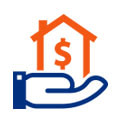
41.2 % less
Cost to Rent
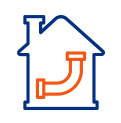
29.4% less
Utilities

6.8% less
Food & Groceries

15.1% less
Health Costs

13.1% less
Transportation

17.3% less
Auto Insurance (Annually)

13.4% less
Auto Sale Tax
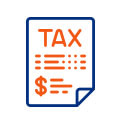
157.1% more
Auto Registration (Annually)

18.9% more
Sales Tax

100% less
State Income Tax

9.9% less
Child Care
Commute Comparison
| Seattle, WA | San Francisco, CA | |
Average Commute Time |
27 mins | 45 mins |
Comparison of gas prices |
$3.58 | $4.49 |
Live Traffic Comparison
Seattle, WA
San Francisco, CA
Climate
Seattle
San Francisco
74
 Average Summer High
Average Summer High68
54
 Average Summer Low
Average Summer Low55
48
 Average Winter High
Average Winter High58
37
 Average Winter Low
Average Winter Low47
152
 Sunny Days Per Year
Sunny Days Per Year259
38
 Rain (inches per year)
Rain (inches per year)25
5
 Snow (inches per year)
Snow (inches per year)0
Seattle Area Tour
Ready to take a trip to visit Seattle? Book your flight and come spend the day with us in your city of interest. We offer complimentary half and full day tours to Seattle


